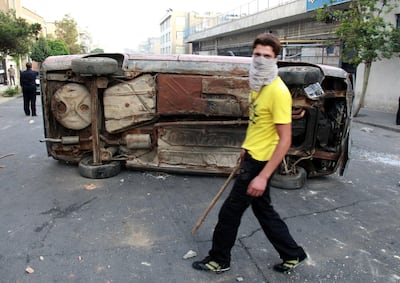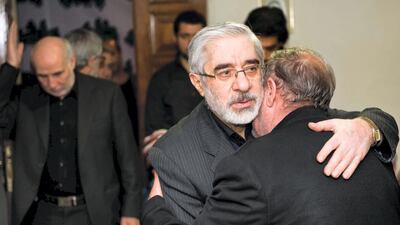The reformist Iranian politicians Mir Hossein Mousavi and Mehdi Karroubi, who have been under house arrest for seven years, will soon be released, a family member has said.
Mr Mousavi and Mr Karroubi disputed the results of a presidential election in which hardliner Mahmoud Ahmadinejad was re-elected in 2009. They were later detained without trial for leading mass protests after the disputed polls. Dozens of people were killed in a crackdown by the regime's security forces.
The two men are regarded as symbols of democracy by Iran's reformist movement, which was neutered during Mr Ahmadinejad's presidency, and both are said to have been in poor health in the past year.
Their case for freedom has been approved by the country’s top security organisation, according to Mr Karroubi's son.
"I have heard that the decision to lift the house arrest was approved by the Supreme National Security Council," said Hossein Karroubi, according to the Kalameh news website, a reformist outlet which has close ties to families of the pair.
The SNSC is chaired by President Hassan Rouhani, a relative moderate elected in 2013 following Mr Ahmadinejad's two presidential terms in office.
However, the reported decision to free Mr Mousavi and Mr Karroubi, now aged 76 and 80 respectively, could still be vetoed in the next 10 days by Iran's supreme leader Ayatollah Ali Khamenei, a dogged critic of their conduct after the disputed election nine years ago.
______________
Read more
Former Iranian president asks Supreme Leader to end house arrests
Iranian reform leader Karroubi ends hunger strike
Forty years since the spark that began Iran's last revolution
______________
"This decision will be presented to the leader so that this case can be concluded," Mr Karroubi's son said.
There was no official announcement regarding the decision.
Reports of the council’s decision come at a time when Iran’s leaders are keen to unite the country's conservative and reformist factions to face down increased pressure from the US and a worsening economic crisis.
On Sunday, Iran’s currency hit a record low of 100,000 rials to the dollar amid the imminent return of full United States sanctions, to be reimposed in two stages on August 6 and November 4.
The currency's weakness has been worsened by US President Donald Trump's unilateral withdrawal in May from the 2015 nuclear deal that Iran agreed with world powers.
That accord, reached during the presidency of Barack Obama, had lifted nuclear related sanctions previously imposed against Iran, in exchange for curbs to Tehran's atomic programme.

Mr Mousavi and Mr Karroubi, stood against Mr Ahmadinejad in the 2009 election.
They claimed the vote was rigged, triggering months of mass protests, particularly in Tehran. Hundreds of thousands took to the streets in the biggest challenge to the system since the Islamic Revolution of 1979.
The pair were placed under house arrest without trial in February 2011, along with Mr Mousavi's high-profile wife, 66-year-old Zahra Rahnavard.
Mr Karroubi's son said the SNSC, Iran's top security committee, which contains officials from the armed forces and top echelons of government, had also agreed to lift restrictions on reformist figurehead Mohammad Khatami, who was the Iranian president from 1997 to 2005.
Now aged 74, Mr Khatami in August last year urged Iran's supreme leader to end the house arrest of opposition leaders.
"By citing your issues and your requests and in your name, I would like to ask the supreme leader to issue an order to solve the issue of the house arrests," he said at the time.
That statement was the first time a high-ranking figure had publicly asked Mr Khamenei to intervene on the issue of house arrests.
Iranian media are banned from showing Mr Khatami's face and strict limits were placed on his movements, yet he is regarded as an opposition leader in his own right and has publicly backed the incumbent president.
Mr Rouhani has repeatedly vowed to seek the release of Mr Mousavi and Mr Karroubi and the call was part of his election campaign in 2013 and re-election last year, with their names frequently chanted at his rallies.
Last year, Mr Karroubi ended a hunger strike, during which he was hospitalised for high blood pressure, after the government reportedly agreed to remove intelligence agents from his home.
The men’s ailing health has raised pressure on Mr Rouhani to push harder for their release.
But despite Mr Rouhani chairing the SNSC there has been no official signal of progress toward their release.

